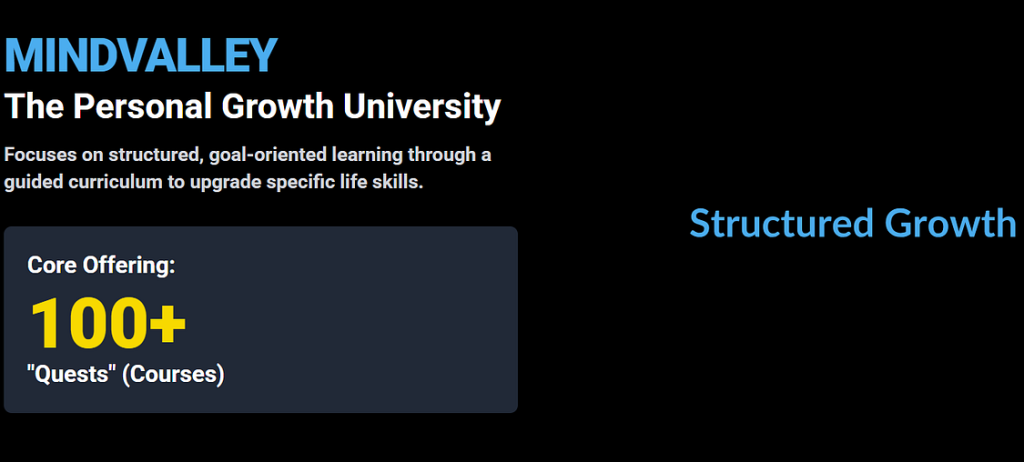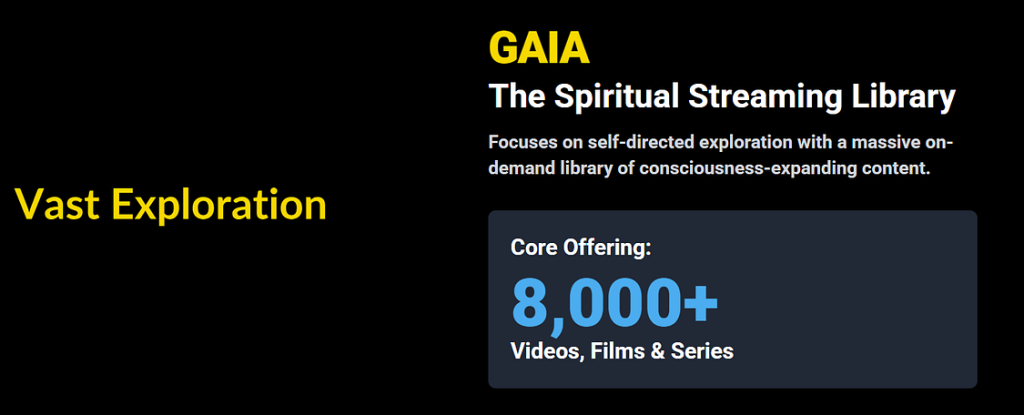Last Updated on October 30, 2025 by vitaliy
So, you’re trying to decide between Mindvalley and Gaia. It’s a choice between Mindvalley and Gaia, a structured, high-end personal growth university and a massive spiritual streaming library. I’ve used both extensively, and I can tell you the marketing materials don’t cover the full story. Let’s get into a real, no-sugar-coating comparison, including the stuff that can be genuinely frustrating about each platform, so you can figure out where to actually put your money.

What is Mindvalley? A Look at Its Core Offerings
Mindvalley is an online learning ecosystem built by Vishen Lakhiani. It’s designed to teach you life skills that traditional education ignores, focusing on “transformational learning” to upgrade your habits, mindset, and overall well-being.
What types of personal development courses does Mindvalley offer?
The course library is broad, covering everything from biohacking and fitness to conscious uncoupling and spiritual awakening. You get access to big names like Jim Kwik for memory, Marisa Peer for hypnotherapy, and Ken Honda for money EQ. The production quality is consistently top-tier, and every course is focused on giving you practical, actionable steps to implement immediately.
How does the quest system on Mindvalley work?
Mindvalley’s courses are called Quests. Instead of a content dump you binge-watch, a Quest unfolds over 20–30 days. You get a short video and a daily task that takes about 20 minutes. This structure is fantastic for building habits, but it has a downside: if you fall behind by a few days, catching up can feel like a chore, and you lose the “do it with the community” vibe, which can be demotivating for some.

What is included in a Mindvalley membership?
A Mindvalley membership gives you access to almost their entire vault of 100+ Quests. This also includes their private social network, thousands of guided meditations, and live calls with instructors. In a significant recent update, they’ve also included their popular Wildfit program in the standard membership, which used to be a separate, expensive purchase. This adds a ton of value. However, be aware that their ultra-premium Lifebook Online program is still sold separately.

What is Gaia? A Deep Dive into Its Content Library
Gaia is a completely different animal. It’s less of a school and more of a massive streaming service — think Netflix for the consciousness and spirituality crowd. It’s a huge repository of videos on yoga, meditation, and topics that are often considered “out there.”
What topics related to spirituality does Gaia cover?
Gaia’s library is vast and deep. You’ll find thousands of videos on yoga, meditation, ancient civilizations, esoteric wisdom, and alternative healing. It features well-known figures in the spiritual space like Gregg Braden and Dr. Joe Dispenza. The content ranges from grounded, practical yoga classes to speculative documentaries about ancient aliens and secret histories.
Does Gaia offer online courses or just documentaries?
Primarily, Gaia offers films, documentaries, and original series. It also has a massive library of high-quality yoga and meditation classes. While it doesn’t have the structured, day-by-day course format of Mindvalley, many of its series function as deep dives into specific topics. The main challenge here is the lack of a defined path; it’s easy to fall down content rabbit holes without a clear objective, which can feel more like entertainment than structured learning.
How can I use Gaia for spiritual growth?
Gaia is best used as a tool for self-directed exploration. You can build a robust daily yoga and meditation practice using their library. You can also use it to expand your perspective by exploring topics that aren’t discussed in the mainstream. It’s perfect for the curious explorer who doesn’t need a step-by-step guide and enjoys making their own connections.

The Not-So-Great Stuff: Pain Points of Mindvalley vs. Gaia
This is the ‘no-sugar-coating’ part I promised. As good as they are, both platforms have real-world frustrations you need to be aware of.
Mindvalley’s Downsides: What to Be Aware Of
Here’s a look at Mindvalley’s Downsides:
- Aggressive Marketing and Hype: Mindvalley’s marketing can feel over-the-top. The promise of rapid, life-altering transformation can set unrealistic expectations. While the content is good, it’s not a magic pill, and some users feel let down when the reality doesn’t match the intense hype.
- The Price Tag: At $399 (or $299 on sale), it’s a significant investment. While the value is there if you use it, the high cost is a major barrier for many. The platform also has a higher-tier “Pro” membership, and the constant upselling can be annoying.
- Complex Cancellation/Support: Some users have reported that canceling their subscription can be complicated and that getting a timely response from customer support for technical issues or billing questions can be slow.
- The “Cult-like” Vibe: The intense focus on community and shared terminology can feel a bit like a “cool kids club” that isn’t for everyone. Some people are put off by the strong branding and what they perceive as a guru-centric culture.
Gaia’s Sticking Points: Potential Frustrations
- Questionable Content Accuracy: This is Gaia’s biggest criticism. The platform hosts a mix of well-researched content alongside highly speculative, pseudoscientific, and conspiratorial documentaries. There’s little to no filter, so you have to use your own discernment, which can be exhausting.
- Technical Glitches: Users frequently report technical problems with the apps and website, such as videos lagging, poor streaming quality, and issues with downloads. These glitches can seriously disrupt a yoga class or meditation session.
- Customer Service for Refunds: Similar to Mindvalley, a common complaint revolves around customer service, particularly when trying to get a refund or resolve a billing dispute.
- Echo Chamber Effect: Because the content is so niche, it’s easy to get trapped in an echo chamber of ideas without any opposing viewpoints. This can be a significant issue for those seeking balanced perspectives.

Is a Mindvalley Membership Worth the Cost?
The nearly $400 price tag is a sticking point for many. Is access to Mindvalley truly worth it?
What are the benefits of access to Mindvalley?
The main benefit is the quality and structure. You’re getting access to some of the best teachers in the world in a format that’s designed for high completion rates. The community aspect is also a huge plus. Being surrounded by thousands of people on a similar personal growth journey can be incredibly motivating. If you actively use 2–3 of their Quests in a year, you’ve likely already gotten your money’s worth compared to buying individual online courses of similar quality.
How does Mindvalley compare to other platforms like Udemy or Coursera?
Udemy and Coursera are more like traditional online course marketplaces. They offer a massive range of subjects, including technical skills, and are often cheaper. However, the quality can be hit-or-miss, and the focus is on information transfer, not deep personal transformation. Mindvalley is a curated, premium experience. You pay more, but the production quality, instructor vetting, and learning methodology are on another level for self-improvement.

Is Gaia the Right Platform for You?
If your interests lean more towards the spiritual and esoteric, Gaia might be a perfect fit.
What are the benefits of using Gaia compared to other online learning platforms?
Gaia’s biggest benefit is its vast and unique library. You won’t find this depth of content on spirituality, ancient history, and alternative health on any other platform. It’s also incredibly affordable for the sheer volume of content you get. For anyone deep into yoga or meditation, the subscription is easily justified by that content alone.
How can I find gaia offers and potentially get a free trial?
Gaia almost always has a 7-day free trial available directly on their website. This is the best way to see if their content resonates with you. They also sometimes run promotions for longer trial periods or discounted initial months. A quick search for “gaia offers” will usually bring up the latest deals.
Does Gaia offer content suitable for beginners in spirituality and holistic practices?
Absolutely. While Gaia has plenty of deep, advanced content, it also has a wealth of material for beginners. There are introductory yoga series, basic guided meditations, and documentaries that provide an overview of various spiritual concepts. The platform allows you to explore without pressure, making it a great starting point for a spiritual growth journey.

What are the Best Mindvalley Alternatives?
If neither Mindvalley nor Gaia feels like the right fit, or if the price is a barrier, there are other great options.
How does Skillshare compare to Mindvalley in terms of personal growth courses?
Skillshare is a fantastic platform with a huge variety of courses, including a growing section on personal growth, productivity, and mindfulness. It’s much more affordable than Mindvalley. However, the courses are project-based and taught by a wider range of instructors, so the quality and depth can vary. It’s a great Mindvalley alternative for creative skills with a side of personal development.
Are there any learning platform alternatives similar to mindvalley for less than 399?
Yes. Besides Skillshare, you could look at Hay House offers, which has a strong focus on spiritual authors and teachers. Another option is The Great Courses Plus (now Wondrium), which provides high-quality, university-level courses on a huge range of topics, including some on philosophy and wellness. While none offer the exact “Quest” model, they provide high-quality content at a lower price point.

Mindvalley and Gaia: Which Platform Best Suits Your Personal Development Goals?
So, how do you choose? It comes down to your primary goal.
I’m interested in both. Is subscribing to both worth it?
If your budget allows, yes. They serve very different purposes and are quite complementary. Use Mindvalley for structured, goal-oriented growth in specific areas of your life (career, health, relationships). Use Gaia for open-ended spiritual exploration, daily yoga, and expanding your perspective on the universe.
Engagement: Active Learning (Mindvalley) vs. Passive Viewing (Gaia)
Based on completion rates and user testimonials, Mindvalley likely offers a more actively engaging experience due to its daily action-based format. The Mindvalley review landscape is full of people who report tangible life changes. Gaia’s engagement is more passive and intellectual, based on watching and absorbing information.
Community: Structured Events (Mindvalley) vs. Niche Forums (Gaia)
Mindvalley events, like Mindvalley University and A-Fest, are large, in-person gatherings designed for deep connection and networking. Their online community is also highly active within the platform. Gaia’s community is less centralized. It exists more in the form of online forums and social media groups where fans discuss the content. Mindvalley puts a much stronger emphasis on building a formal, interactive community.
The Bottom Line: How to Choose Your Path
Here’s the bottom line: The choice isn’t just about content; it’s about your goal. Choose Mindvalley if you want a structured curriculum, actionable steps, and a clear path to improving specific life skills. Choose Gaia if you want an affordable, vast library to explore your spiritual curiosity at your own pace. Don’t just pick a platform; pick a path.
Mindvalley vs Gaia: Which Platform Should You Choose?